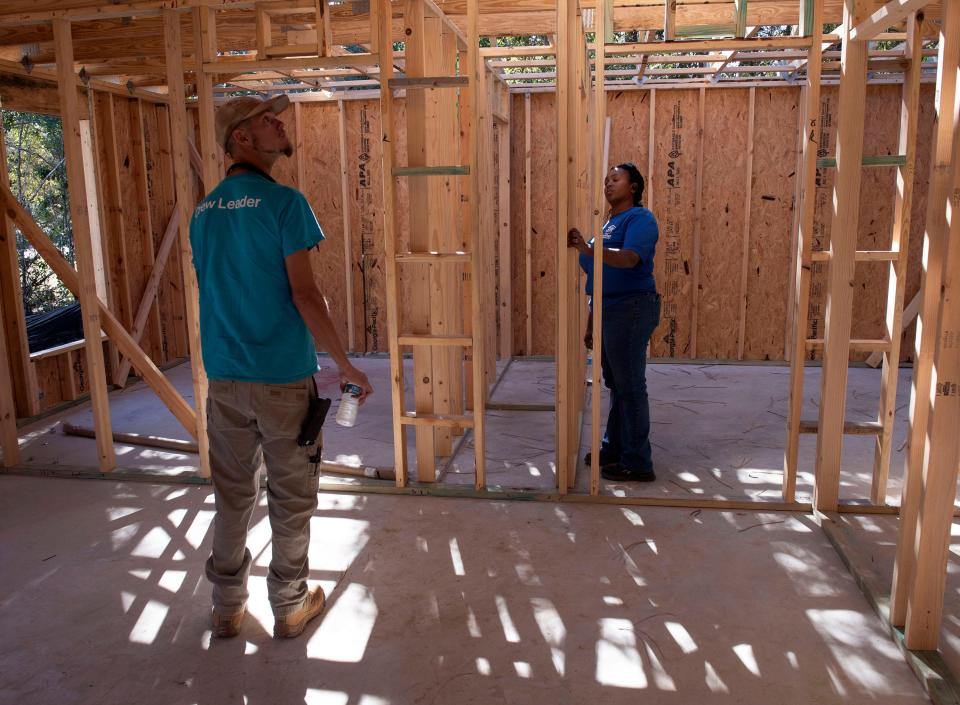Pensacola's hot housing market leaves dwindling options for affordable housing programs
Affordable housing programs have stayed afloat throughout the pandemic but are facing future challenges as the real estate market becomes more competitive and available lots become scarcer.
Pensacola's housing market — much like the rest of the country — has boomed in the past year, with the average home costing about $50,000 more than it did a year ago and the housing stock not high enough to meet demand. While that creates a cut-throat market for homebuyers, it puts even more strain on low- and moderate-income buyers who are already more limited in their options.
"One of the biggest problems we have is the demand is greater than supply," Pensacola Habitat for Humanity President and CEO Sam Young said. "You've got flippers out there, speculators out there, builders making a business out of buying them, rehabbing them and renting them, so there's just a lot of competition for a home in that price range."

Market may be cooling: More homes for sale in Pensacola means red-hot real estate market may be cooling
Now is the time to start looking: Looking to buy or rent in Pensacola? Experts say now is a good time to start house hunting
Patricia Lott, the general counsel for the Escambia County Housing Finance Authority, said first-time homebuyers are being pushed into higher priced homes as the average home price increases, and the margin of profit for their affordable housing builders is getting more slim.
The finance authority facilitates an urban infill model where they take vacant lots within city or county limits and give builders a no-interest loan to construct a new home on them, under the agreement that the home be sold within a certain price range. They also assist first-time buyers — or some previous homeowners under certain conditions — with down payment assistance and mortgage financing.
"We've noticed, I would say in the last four to five months, there has been a slowdown in our pipeline as affordable housing gets harder to locate for the people we serve," Lott said.
She said a few years ago, the affordable home price range directive given to builders was in the $130,000 to $140,000 price range, whereas now it's up to about $180,000.
Homeless campsites: Pensacola pumps the brakes on homeless funding proposals, delays 3 new homeless campsites
Foreclosure rates: Foreclosure rates are at a generational low. What does that mean for the average homeowner?
As developers eye parcels downtown and beyond for construction of townhomes, apartments or shotgun-style homes, the available inventory for these affordable housing type programs dwindles.
"Our infill program is mostly within the city … and what we're looking for is vacant lots in otherwise developed areas as that addresses both urban blight and it's putting people where other people already are," Lott said.

Pensacola Habitat has had a successful 2021 with a surge in builds, but is starting to make plans to address future struggles. The organization built 27 affordable homes for buyers last year and is on pace this year to double that number, Young said.
But the organization relies on finding vacant lots or homes in need of renovation that they're being priced out of in the open market.
"It's increasingly more apparent we are going to need partners in the community to continue our mission," Young said.
Habitat hasn't experienced high mortgage delinquency rates through the pandemic, something Habitat Vice President of Development and Communications Crystal Scott attributes to a rigorous pre-housing education program Habitat participants complete. But they receive between 1,000 and 1,500 applications per year and only have the capacity — and applicants passing eligibility criteria — to approve about 6% of that number.
Habitat recently has partnered with Escambia County as a creative way to bypass the open market and was deeded four lots on which volunteers will build affordable homes. Being deeded or buying county-owned lots at a below-market price is one way Young said Habitat is looking to continue growing in coming years.
"When we find those infill lots on the open market, we try to acquire them and we do that every month, but as land prices are escalating, it becomes more and more challenging to identify and afford infill lots," he said. "That strategy continues, but for us to continue to grow, we need to find other avenues of land acquisition and the partnership with the county is probably the best opportunity we have available to us right now."
Young said in most cases, families are paying less on a mortgage than they were in rent, which in a low-income budget can be "life changing." He said that the city, county and community have been more engaged during the past year in talking about affordable housing solutions, but it's going to take a long-term effort to move the needle.
"There needs to be a collective strategy that involves a number of different organizations and institutions and that requires leadership," he said. "Frankly, I think there's been a lack of leadership with regard to this problem. ... There are a lot of well-intended people and organizations and municipalities that want to tackle this, but it requires sustained leadership and sustained focus on the problem."
Lott agreed, saying a collaborative effort is needed.
"I think that all the elements of the community really getting together and talking is a good thing," he said. "My hope would be that they can grab ahold of a project that's doable. I would say the last thing you want to do is try to address all the problems at once and never get started."
Emma Kennedy can be reached at ekennedy@pnj.com or 850-480-6979.
This article originally appeared on Pensacola News Journal: Pensacola Habitat partners with Escambia County to build affordable homes

